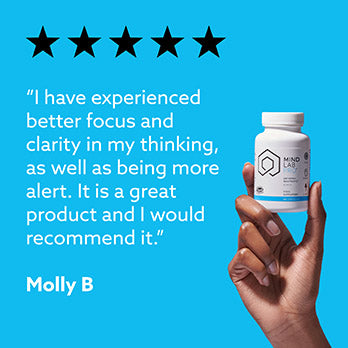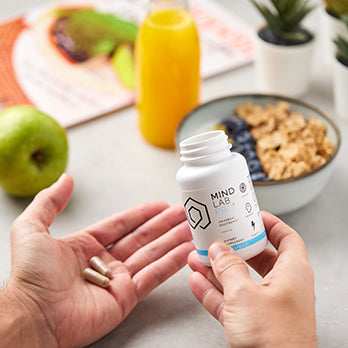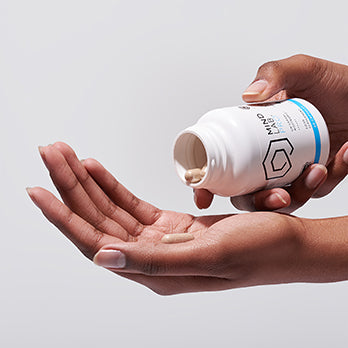Are you constantly feeling stressed? Tired? Rundown? Looking for a pick me up without having to rely on heavy stimulants to keep you going?
There's no denying that a shot of caffeine will do the trick—both mentally and physically—but the side effects that come with chronic stimulant use can be less than impressive for your mental performance.
So, if you're looking for something to kick your cognitive wheels into motion, we've got just the thing. The medicinal and health-promoting effects of rhodiola rosea come from its root, and it's been used for centuries in the treatment of various conditions, ranging from stress and anxiety to chronic fatigue and depression.
We're diving into the nitty-gritty of this powerful adaptogen and showing you how it can take your mental performance to new heights.
What is Rhodiola Rosea?
You've probably heard about adaptogens before. They're plant compounds that function to enhance the "state of non-specific resistance" in stress 1.
Plant adaptogens exhibit several powerful health-boosting properties, including neuroprotection, anti-fatigue, antidepressive, anxiolytic, nootropic, and CNS stimulating activity, along with a potent anti-fatigue effect, especially where tolerance to mental exhaustion and attention are concerned.
The major stress-protective activity of adaptogens is linked to their ability to regulate homeostasis through several mechanisms linked to hypothalamic-pituitary-adrenal (HPA) axis and regulating key mediators involved in the stress response 1.
But what exactly is rhodiola, and why is it front-page wellness news?
The genus Rhodiola (Crassulacea) comprises roughly 200 species of plants, of which 20 or so have been used in the traditional medicines of Russia, Scandinavia, and Asian countries for decades for their various health benefits 2.
Of the 200 some-odd plants, Rhodiola rosea is the most well-known across Europe and North America, widely sold as a popular natural health supplement.
Also known as golden root or Arctic root, traditional uses of the herb were for the treatment of headaches, hysteria, "hernias", and discharges, but more recently, it's been touted for its adaptogenic properties and benefits for increasing attention and endurance in fatigue, as well as increasing stress resilience and preventing or reducing diseases related to the neuro-endocrine and immune system abnormalities 3.
If that wasn't enough, it has also been reported to improve cognitive function, enhance memory and learning, and support brain health 4. It exerts all these powerful benefits by increasing levels of 5-HT (serotonin) and norepinephrine in the cerebral, prefrontal, and frontal cortex while upregulating dopamine and acetylcholine (ACh) in the limbic system pathways—the major route that's responsible for emotional calming 5, 6.
These powerful health benefits are attributed to several biologically active substances in rhodiola, including organic acids, flavonoids, tannins, and phenolic glycosides 7. But the adaptogenic properties, however, are mainly attributed to the glycoside salidroside.
4 Science-Backed Health Benefits Of Rhodiola
1. Improves Resistance To Stress
We all experience stress in some capacity, whether it's with family, relationships, work, finances, or the like. When stress hits, there are characteristic changes in several hormones and parameters associated with the central nervous system and hypothalamic-pituitary-adrenal (HPA) axis.
Some of these include increases in cortisol secretion, reduced sensitivity of the HPA to feedback down-regulation, and major depletion of catecholamines like norepinephrine and dopamine 7.
Acute bouts of stress are beneficial for the body and strengthen immune responses, but chronic stress can be detrimental on several levels. In order to combat stress, the body must adapt—and that's where adaptogens come into the picture.
The adaptogenic properties of rhodiola have been attributed mainly to its ability to influence levels and activity of monoamines and opioid peptides such as beta-endorphins 7.
It's also been suggested to prevent both catecholamine release and the resulting increase in cAMP levels, as well as attenuate depletion of adrenal catecholamines induced by acute stress.
What's more, rhodiola supplementation may also improve symptoms of burnout, which can occur alongside chronic stress.
A 2017 study of 118 people dealing with stress-related burnout supplementing 400 mg of rhodiola daily for 12 weeks showed marked improvements in symptoms like stress and depression, both of which are common to burnout 8.
2. Fights Fatigue
Stress, lack of sleep, and poor nutrition are just some of the factors that can cause fatigue, which can lead to both physical and mental feelings of exhaustion. While altering your lifestyle habits can be a major benefit for fighting fatigue, so can supplementing rhodiola.
A 2017 study of 100 subjects with symptoms of prolonged or chronic fatigue taking 400 mg of rhodiola extract for eight weeks saw significant declines in symptoms at the end of the trial, with the greatest change seen after the first week of treatment 9. They say improvements in:
- Symptoms of stress
- Fatigue
- Quality of life
- Mood
- Concentration
What's more, rhodiola was first introduced into the USSR after finding that it effectively recovered mental and physical working capacity during and after prolonged periods of intensive mental and physical work 10.
The positive effects of rhodiola on cognitive function were seen in a study of 128 people between the ages of 17 and 55 with pronounced states of fatigue whose symptoms significantly improved or disappeared after rhodiola supplementation.
Another study found that rhodiola improved exhaustion, as well as mental and physical work capacity after post-influenza fatigue.
3. Boosts Brain Health And Cognitive Performance
A healthy diet, regular physical activity, stress management, and sufficient sleep are key factors in keeping your brain healthy and functioning optimally, but certain supplements—especially the nootropics—can also boost brain function and performance.
Several studies have shown rhodiola to exert beneficial effects on cognition, mental stress, and reducing the effects of mental fatigue. While the exact mechanism behind how it does so isn't clear, it's thought to interfere with HPA axis function to elicit actions on several molecular pathways, as well as modulate various cognitive markers including glutathione, NADH/NADPH, superoxide dismutase, malondialdehyde, NO/NOS, acetylcholine, caspase-3, tumor necrosis factor-α, nuclear factor κB, and more 11.
On top of that, rhodiola has also shown beneficial effects for the treatment of certain age-related neurodegenerative diseases such as Alzheimer's, Parkinson's, and cerebrovascular disease, which may be the result of its antioxidant properties 12.
4. Enhances Memory And Learning
Want a sharper memory? Wish you could learn as quickly as a child? Turns out that rhodiola may help you achieve that! A 2018 systematic review and meta-analysis looked at the current evidence for rhodiola's effect on learning and memory function using a total of 36 animal studies 13.
Results show that compared to the control groups, rhodiola supplementation exhibits significant improvements in an array of tests for learning and memory, which may be mediated through several of rhodiola's health-promoting properties, including:
- Antioxidant activity
- Cholinergic regulation
- Anti-apoptosis activities
- Anti-inflammatory
- Enhancing coronary blood flow
Want More For Your Mind? We've Got You!
Rhodiola may pack a punch for brain function, but it's not the only compound capable of boosting brain health and optimizing cognitive performance.
In fact, Mind Lab Pro has seven more powerful brain-boosting compounds that will enhance your cognition like you've never experienced before.
- Citicoline: Citicoline helps to energize brain cells while optimizing the neural electrical impulses that power all thought. It's the precursor for the production of phosphatidylcholine (PC), the major phospholipid found in neuronal cell membranes. In combining brain energy + phospholipid synthesis, citicoline may be uniquely qualified for the intensive task of brain cell regeneration and repair, all while supporting neurotransmitters—including acetylcholine—and protecting the brain through its powerful antioxidant activity. Research shows that citicoline can enhance energy and mental performance without the typical crash of stimulants. In human research, citicoline has been shown to support reaction time, mood balance, memory, attention, focus, and concentration. Long-term, it may also help maintain healthy brain function against age-related structural changes and mental decline.
- Bacopa monnieri: As another power adaptogen, bacopa's active bacosides are powerful antioxidants that enhance other brain antioxidants like superoxide dismutase (SOD) and glutathione peroxidase (GPx). This synergistic antioxidant activity protects brain cells from the age-accelerating effects of free radicals. Bacosides can also alter concentrations of neurotransmitters like acetylcholine, GABA, and serotonin, all of which play a role in focus, memory, and mood. On top of that, bacopa has also been shown to elicit benefits on memory performance, learning, and retention, as well as accelerating mental processing, optimizing cognition under stress, and promoting relaxation.
- Lion's mane: Medicinal mushrooms are magic when it comes to cognition, and lion's mane may take the mushroom crown. Lion's mane supplies active nootropics called hericenones and erinacines that have been shown to stimulate nerve growth factor (NGF) production, which may support neural regeneration and myelin nerve sheath synthesis, as well as brain plasticity for storage of new learning and memories. One study found that lion's mane mushrooms can lead to significant cognitive improvements in adults aged 50-80 with mild cognitive impairment. Other clinical research suggests that lion's mane can also support mood balance.
- Phosphatidylserine: Phosphatidylserine is a phospholipid compound that makes up roughly 15% of the brain's fats. It is concentrated in brain cell membranes, where it functions to maintain membrane fluidity, optimize receptors, and regulate levels of neurotransmitters like acetylcholine and dopamine. It supports brain cell energy production by enhancing glucose metabolism and may boost nerve growth factor (NGF) levels to support neuronal formation, maintenance, and repair. PS also helps immune cells dispose of damaged, toxic brain cells, thereby sparing neighboring brain cells from collateral damage. What's more, studies show that PS may sharpen memory, slow cognitive decline, and promote a positive-minded outlook, all while preventing brain degeneration and slowing the progression of memory loss and cognitive decline.
- N-Acetyl-L-Tyrosine: L-Tyrosine is an amino acid used to synthesize catecholamines—dopamine, epinephrine, and norepinephrine—that play a role in memory, mood, and mental processing. Research suggests that tyrosine may counter the adverse effects of stress on the brain, helping to support the synthesis of the neurotransmitters most affected by high-stress mental performance. It's also suggested that L-tyrosine can improve working memory under multitasking conditions and optimize cognitive performance under high stress, fatigue, and sleep deprivation. What's more, it has recently gained attention for its ability to maximize attention and focus.
- L-Theanine: L-Theanine is another amino acid that has powerful effects on increasing alpha brainwave activity, linked to a state of wakeful relaxation and enhanced creativity. L-theanine can help settle excitable neurotransmitters while promoting the release of calming neurotransmitters like serotonin, dopamine, and GABA. Research also suggests it may protect neurons from damage, potentially helping to maintain clear thinking during the aging process. Simply put, L-Theanine can instill a state of calm, relaxed tranquillity while simultaneously sharpening attention, alertness, and focus.
- Maritime pine bark: MPB supplies a powerful complex of proanthocyanidin antioxidants that can cross the blood-brain barrier and help neutralize the damaging effects of toxic free radicals that concentrate in the brain as a byproduct of normal cell metabolism. Pine bark extract's proanthocyanidins also signal the release of nitric oxide (NO), which relaxes blood vessels and increases blood flow to the brain, thereby enhancing the delivery of brain-energizing oxygen and glucose. MPB's additional proanthocyanidin bioactivities combine to provide multi-pathway brain regeneration support that has the potential to reverse age-related cognitive decline. Taken together, it shows a lot of promise for enhancing mental energy, attention, learning, and focus in the short-term while maintaining memory, mental clarity, and brain health long-term.
Final Thoughts
With all of that said, there are plenty of powerful adaptogenic compounds and nootropics that can take your mental performance to an entirely new level, but not like rhodiola can.
It has been shown to stimulate and sustain neurotransmitters that are critical to cognitive function; strengthen resistance to mental stress; and support brain energy by promoting transparent, calm thinking under taxing conditions.
If you're looking for stronger mental processing, memory, learning, attention span, mood, and work capacity, rhodiola should be your only option.
References
- A Panossian, G Wikman. Effects of Adaptogens on the Central Nervous System and the Molecular Mechanisms Associated with Their Stress-Protective Activity. Pharmaceuticals (Basel). 2010;3(1):188-224.
- A Booker, B Jalil, D Frommenwiler, et al. The authenticity and quality of Rhodiola rosea products. 2016;23(7):754-762.
- A Panossian, G Wikman, J Rosenroot (Rhodiola rosea): traditional use, chemical composition, pharmacology and clinical efficacy. Phytomedicine. 2010;17(7):481-493.
- NA Suliman, CN Mat Taib, MA Mohd Moklas, MI Adenan, MT Hidayat Baharuldin, R Basir. Establishing Natural Nootropics: Recent Molecular Enhancement Influenced by Natural Nootropic.Evid Based Complement Alternat Med. 2016;2016:4391375.
- Lazarova MB, Petkov VD, Markovska VL, Petkov VV, Mosharrof A. Effects of meclofenoxate and Extr. Rhodiolae roseae L. on electroconvulsive shock-impaired learning and memory in rats. Methods Find Exp Clin Pharmacol. 1986;8(9):547-552.
- M Furmanowa, E Skopińska-Rozewska, E Rogala, M Hartwich. Rhodiola rosea in vitro culture—phytochemical analysis and antioxidant action.Acta Societatis Botanicorum Poloniae. 2014;67(1):69–73.
- GS Kelly. Rhodiola rosea: a possible plant adaptogen.Altern Med Rev. 2001;6(3):293-302.
- S Kasper, A Multicenter, open-label, exploratory clinical trial with Rhodiola roseaextract in patients suffering from burnout symptoms. Neuropsychiatr Dis Treat. 2017;13:889-898.
- Y Lekomtseva, I Zhukova, A Wacker. Rhodiola rosea in Subjects with Prolonged or Chronic Fatigue Symptoms: Results of an Open-Label Clinical Trial. Complement Med Res. 2017;24(1):46-52.
- ED Krasik, ES Morozova, KP Petrova, GA Ragulina, LA Shemetova, VP Shuvaev. Therapy of asthenic conditions: clinical perspectives of application of Rhodiola roseaextract (golden root). In: Avrutskiy G.Y., editor. Proceedings modern problems in psycho–pharmacology, Kemerovo; Siberian Branch of Russian Academy of Sciences. Kemerovo, USSR; 1970. pp. 298–300
- T Koop, A Dienel, M Heldmann, TF Mü Effects of a Rhodiola rosea extract on mental resource allocation and attention: An event-related potential dual task study.Phytother Res. 2020;34(12):3287-3297.
- W Zhuang, L Yue, X Dang, et al. Rosenroot (Rhodiola): Potential Applications in Aging-related Diseases. Aging Dis. 2019;10(1):134-146.
- GP Ma, Q Zheng, MB Xu, et al.Rhodiola rosea Improves Learning and Memory Function: Preclinical Evidence and Possible Mechanisms. Front Pharmacol. 2018;9:1415.




































